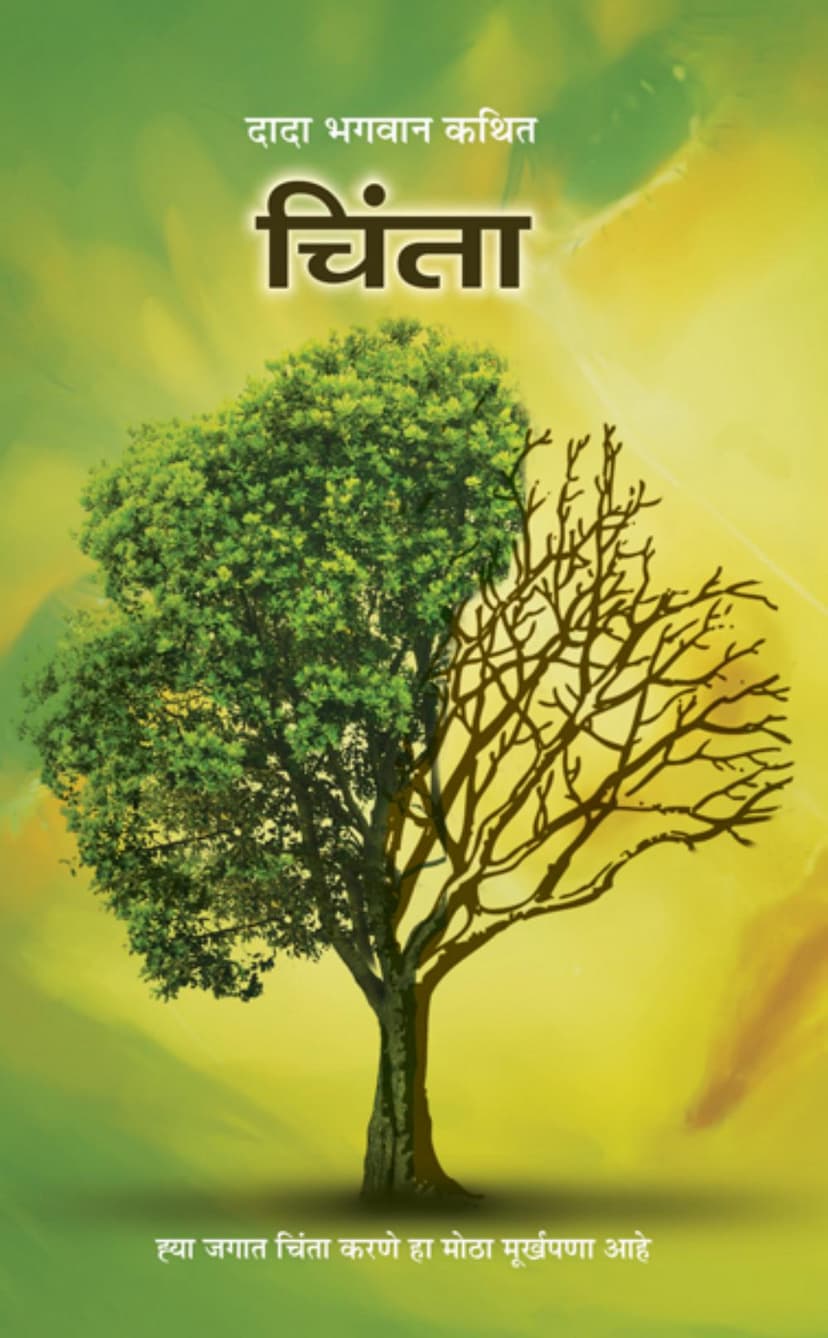Chinta
Added to library: September 1, 2025

Summary
Here's a comprehensive summary of the Jain text "Chinta" by Dada Bhagwan, based on the provided pages:
Book Title: Chinta (Worry/Anxiety) Author: Dada Bhagwan (as conveyed through his teachings) Publisher: Dada Bhagwan Aradhana Trust Language: Marathi (with original Gujarati compilation and Hindi translation)
Core Message: The book emphatically states that worrying is a great foolishness in this world.
Introduction and Context:
- The book is a compilation of the teachings of Dada Bhagwan, a spiritual master whose teachings emphasize self-realization and freedom from worldly suffering, particularly anxiety.
- Dada Bhagwan (born as Ambalal Muljibhai Patel) attained self-knowledge in 1958 and subsequently facilitated this for others through an "Akram" (non-sequential) path, often described as a "lift" or "shortcut" to spiritual liberation.
- The teachings are presented as the direct words of Dada Bhagwan, translated into Marathi for wider accessibility.
- The core philosophy presented is rooted in the understanding that the Self (Atma) is the true reality, while the body and the ego ("I am the doer") are transient and a source of suffering.
Key Teachings and Concepts from the Text:
-
Worry as Fire and Ego:
- Worry is likened to a burning fire that consumes one, disrupts sleep, appetite, and invites diseases.
- It is considered a symptom of ego, the false belief that "I am the doer" or "I am managing this."
- Worry arises from not understanding the scientific laws that govern the universe and one's actions within it.
-
The Nature of Worry:
- Worry is not just thinking; it's when thoughts create a "whirlpool" or a "twist" in the mind, leading to a state of distress.
- It's compared to a "vortex of thoughts" where the mind gets tangled.
- Worry is described as an "ego-driven manifestation" that leads to suffering and hinders progress.
-
Consequences of Worry:
- Worry spoils tasks and prevents them from being completed successfully.
- It binds "antary karma" (obstacles to spiritual progress) and leads to lower states of existence (animal realm).
- It disrupts inner peace, leading to sleeplessness and various ailments.
- Worry attracts negative consequences, such as financial loss and a sense of helplessness.
-
The True Doer and "Vyavasthit Shakti":
- The root cause of worry is the ignorance of the true "doer." In Jain philosophy, actions are governed by scientific circumstantial evidences, collectively termed "Vyavasthit Shakti" (the governing power of nature).
- No one is an independent doer; everyone is merely an instrument (nimitta).
- Understanding that "Vyavasthit Shakti" manages the world is key to relinquishing the ego and thereby eliminating worry.
-
Freedom from Worry:
- Self-Knowledge (Atmajnaan): The ultimate solution to worry is attained through Self-knowledge, where one realizes their true nature as the Soul (Atma). This knowledge helps detach from the ego and the false belief of being the doer.
- Trust in God/The Universe: Surrendering to the divine plan or "Vyavasthit Shakti" and trusting that everything is happening for the best is crucial. The book quotes Krishna Bhagwan: "O Soul, why do you worry? Whatever Krishna intends, will happen."
- Living in the Present: Focusing on the present moment and enjoying what is currently available ("prapt bhoga") without worrying about the future ("aprapt ki chinta") is essential.
- Finding a True Sat-sang (Spiritual Gathering): Attending satsangs where genuine peace is found, and worry subsides, is recommended. If a satsang doesn't help eliminate worry, it's advised to find another.
- Understanding the Ego: Recognizing that worry is a product of ego and working to diminish this ego through self-awareness is vital.
-
Distinction between Thought and Worry:
- Thought is natural, but when thoughts become a whirlpool or twist, it turns into worry. Healthy thoughts within a normal range are acceptable, but when they exceed a certain limit and cause internal turmoil, they become worry.
-
Analogy and Examples:
- Fire: Worry is like a burning fire that consumes.
- Ratalu (Sweet Potato): The state of a person consumed by worry is compared to a sweet potato being roasted in embers.
- Chef and Guests: Just as a guest should eat what is served without interfering in the kitchen, we should accept what life offers without interfering with the "natural order."
- Nature's Care: Nature provides essential things like air and water freely, demonstrating a caring system. Worrying is like being an ungrateful guest.
- Laborers vs. Owners: Laborers, who are less attached and egocentric, often sleep peacefully, while wealthy owners worry incessantly. This is linked to their karmic destiny and their attachment.
-
The Role of the Gnani (Enlightened One):
- A Gnani can help resolve worries. Dada Bhagwan offers to resolve worries in an hour, guaranteeing that if a single worry remains, one can sue him.
- The Gnani provides the "Gyan" (knowledge) that dissolves the ego and the belief of being the doer, thereby eradicating worry.
Conclusion:
The book "Chinta" by Dada Bhagwan is a profound spiritual guide that aims to liberate readers from the pervasive problem of worry. It advocates for understanding the laws of karma and existence, detaching from the ego, and trusting in the divine governance of the universe. By attaining Self-knowledge and adopting a life of present-moment awareness, one can achieve lasting peace and freedom from anxiety, ultimately leading to liberation. The teachings emphasize that worry is a self-inflicted suffering stemming from ignorance and ego, and that the path to freedom lies in understanding one's true nature.